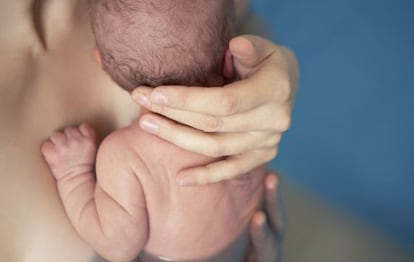Birth rate in Spain rises for first time in half a decade
Average maternity age up to 31.8 years in 2014 compared to 31.7 years the year before Life expectancy for Spaniards has increased to a record 83 years

A total of 426,303 babies were born in Spain in 2014, 588 more than in 2013. The figure marks a rise of 0.1% year-on-year, and is the first increase recorded in the country in five years.
That’s according to data just released by Spain’s National Statistics Institute (INE) as part of its Natural Population Movement report, which also contains another record figure: average life expectancy for Spaniards has risen to 83 years.
In terms of regions, Madrid has the highest life expectancy in Spain, at 84.4 years
In terms of births, the report shows that the number of babies born in Spain has fallen 18% since 2008, a year that saw a 30-year high of 519,779 newborns. Last year’s slight 0.1% increase was partly due to a rise in the number of children per woman: the figure increased from 1.27 in 2013 to 1.32 in 2014. The number of births per 1,000 inhabitants, however, remained steady at 9.1.
Meanwhile, the number of fertile women (those aged between 15 and 49, according to the statistical series) fell from 11.6 million in 2009 to 10.98 million last year, as a result of a decrease in the number of immigrants living in Spain, and the high emigration rate among Spaniards – both factors attributable to the lingering effects of the economic crisis.
Marriages on the rise
The INE report also contains a section about marriages in Spain. In 2014, 158,425 couples got married, a 1.3% rise on 2013. The number of marriages per 1,000 inhabitants stood at 3.4 last year, a 0.1% rise on the previous year.
The average age of couples getting married in 2014 was 36.9 years for men and 34 years for women. Among married couples of different sexes, in 16% of cases at least one partner was not from Spain – a fall from 18.1% in 2013.
Meanwhile, 2.1% of the total of registered marriages corresponded to same sex partnerships (3,300 couples).
The report goes on to explain that of the 426,303 babies born last year, 17.8% had a non-Spanish mother, compared to 18.6% the year before. Among immigrants in Spain, the number of children per female was 1.61 last year, compared to 1.27 for Spanish women.
The average age of women who gave birth has also risen once again, to 31.8 years in 2014, compared to 31.7 in 2013 and 30.8 in 2007. Broken down, that average is 29.3 years among immigrants in Spain and 32.3 among Spanish women.
In terms of deaths, the report reveals that 395,045 people died in Spain last year, a 1.2% rise compared to the previous year. That’s 8.5 deaths per 1,000 inhabitants, a 0.2-point increase on 2013. Infant mortality was 2.9 deaths per 1,000 live births, 0.2 points higher than in 2013.
Based on these figures, the 2014 rate of natural increase (the crude birth rate minus the crude death rate of a population) fell 11.6% compared to the previous year, with 31,678 people – the lowest figure since 2000. What’s more, there was a negative rate (more deaths than births) in nine regions: Galicia, Castilla y León, Asturias, Aragón, Extremadura, the Basque Country, Cantabria, La Rioja and Castilla-La Mancha.
Life expectancy also rose in 2014 compared to the previous year, going up 0.2 years to 83, the highest on record. Average life expectancy for men in Spain is 80.2 (0.2 years higher than in 2013), and 85.7 (0.1 higher) for women.
In terms of regions, Madrid has the highest life expectancy in Spain, at 84.4 years, followed by La Rioja (83.9) and Castilla y León (83.7). The lowest figures are to be found in Andalusia (81.9), Ceuta (80.7) and Melilla (80.3).
Tu suscripción se está usando en otro dispositivo
¿Quieres añadir otro usuario a tu suscripción?
Si continúas leyendo en este dispositivo, no se podrá leer en el otro.
FlechaTu suscripción se está usando en otro dispositivo y solo puedes acceder a EL PAÍS desde un dispositivo a la vez.
Si quieres compartir tu cuenta, cambia tu suscripción a la modalidad Premium, así podrás añadir otro usuario. Cada uno accederá con su propia cuenta de email, lo que os permitirá personalizar vuestra experiencia en EL PAÍS.
¿Tienes una suscripción de empresa? Accede aquí para contratar más cuentas.
En el caso de no saber quién está usando tu cuenta, te recomendamos cambiar tu contraseña aquí.
Si decides continuar compartiendo tu cuenta, este mensaje se mostrará en tu dispositivo y en el de la otra persona que está usando tu cuenta de forma indefinida, afectando a tu experiencia de lectura. Puedes consultar aquí los términos y condiciones de la suscripción digital.








































